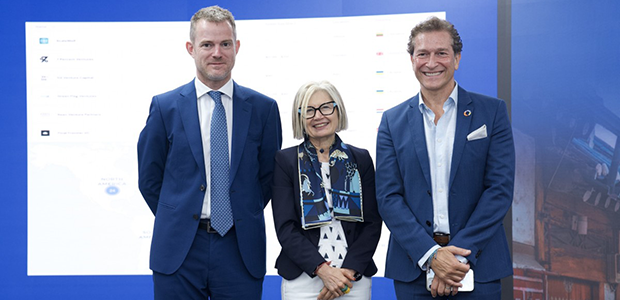
Fincantieri expands its Innovation Network
As part of the open innovation strategy launched last year, Fincantieri announces the opening of its Innovation Antenna in South Korea, supported operationally by Mind the Bridge. The initiative marks a key milestone in Fincantieri’s open innovation strategy and reinforces the Group’s commitment to international collaboration on advanced maritime technologies.
The announcement was made during the Scaleup Summit Seoul 2025, co-organised with Mind the Bridge, in the presence of Italy’s Ambassador to South Korea, Emilia Gatto, and Fincantieri’s top management.
Following the successful opening of its first Innovation Antenna in Silicon Valley last October, Fincantieri has identified South Korea as its next global innovation hub. The country’s thriving ecosystem, particularly in shipbuilding, robotics, and automation, makes it a strategic destination for the Group’s innovation efforts.
Located in the heart of Seoul’s tech district, the new Antenna will enable direct connections with the local innovation ecosystem, including startups, research centres, and industrial players. As highlighted in the newly released 'Tech Scaleup South Korea 2025 Report - At the Frontier of Hard Tech' report by Mind the Bridge, South Korea is on track to overtake Japan and position itself as the third largest innovation hub in Asia, after China and India.
The increasing relevance of dual-use innovation (technologies that serve both civilian and defence applications) is highlighted in the new 'Dual Use Technologies: The Strategic Frontier of Innovation – 2025' report, also released at the launch event. The report, produced by Mind the Bridge in collaboration with Fincantieri and Crunchbase, provides a comprehensive analysis of VC funds globally with an explicit investment focus on dual-use and defence-tech startups.
With 2,127 scaleups and over $71.6 billion raised, South Korea ranks among the world’s top 16 “Star” ecosystems, according to the ‘Tech Scaleup South Korea 2025 Report - At the Frontier of Hard Tech’ report.
- The country reports a scaleup density of 4.1 per 100,000 people and 2.7% of GDP invested in innovation – one of the highest levels globally. Public policies such as Super Gap Projects and deep-tech incentives have fuelled the emergence of two unicorns and 400+ startups, facilitating commercialisation and IPO access.
- Seoul, with 1,555 scaleups and over $50.7 billion raised, is now a “Nova Star” on MTB’s Innovation Ecosystem Life Cycle Curve – on par with global hubs like Boston, Singapore, and Texas.
- South Korea ranks 4th globally in robotics market value and 1st in robot density, with a $2.2 billion national plan to deploy one million robots by 2030 across industry, healthcare, and public services.
- With 99.7% of Korean trade moving by sea, the country’s port infrastructure is a strategic priority: Busan is undergoing a $10 billion expansion and Incheon will become the first fully automated smart port.
South Korea is home to 462 dual-use scaleups, which have collectively raised over $8.3 billion, according to the ‘Dual Use Technologies 2025 Report - The Strategic Frontier of Innovation’ report which was created in collaboration with Fincantieri and Crunchbase. The report – officially presented at the Scaleup Summit Seoul – maps the global dual-use landscape, identifying more than 17,600 startups operating across both civilian and defence domains in NATO and allied countries, and highlights several key emerging trends.
- Dual-use scaleups across NATO and allied countries increased by 16% year-on-year, now accounting for 27% of total scaleups in the region. Fifty-five per cent of newly created scaleups in the last eight months operate in dual-use sectors.
- Total funding raised by dual-use scaleups globally surpassed $1.2 trillion. In the defence-tech sector (including dual-use), $70.8 billion was raised from October 2024 to May 2025 – +27% year-on-year. Approximately 70% of new scaleup funding in NATO and allied countries between October 2024 and May 2025 was directed toward companies developing dual-use technologies.
- Energy, security, and surveillance are growing verticals, while health, sustainability, and mobility are also increasingly seen as strategic dual-use domains.
- On average, pure defence-tech scaleups raise $80 million, dual-use $66 million, and purely civilian tech startups $50 million, highlighting higher capital intensity and barriers to entry.
- The US hosts 50% of global dual-use scaleups, while Europe is catching up fast with growing hubs in the UK, France, Germany, and Israel. APAC growth is being led by Japan, South Korea, and Australia.

